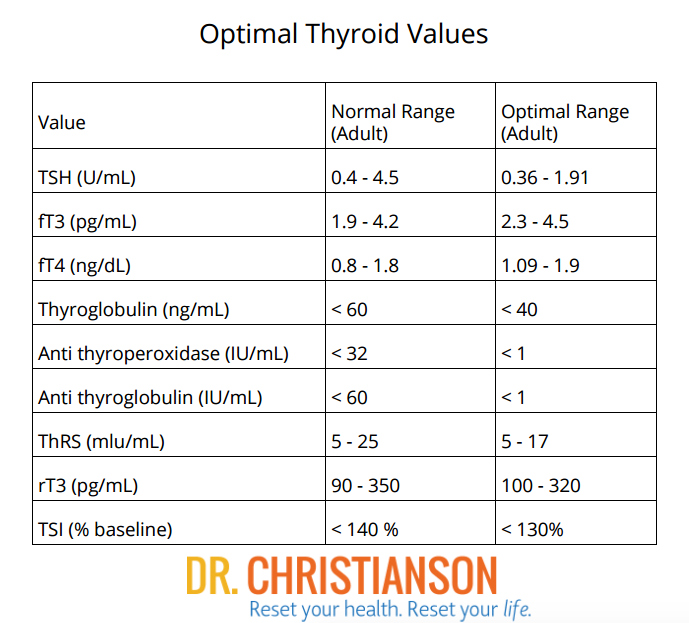Browse by Topic
J Clin Endocrinol Metab. Treatment for primary hypothyroidism: current approaches and future possibilities. Drug Des Devel Ther.
Diagnosis and management of treatment-refractory hypothyroidism: an expert consensus report. J Endocrinol Invest. Hennessey JV, Espaillat R. Int J Clin Pract. Celi FS, et al. Metabolic effects of liothyronine therapy in hypothyroidism: a randomized, double-blind, crossover trial of liothyronine versus levothyroxine. Clinical practice guidelines for hypothyroidism in adults: Cosponsored by the American Association of Clinical Endocrinologists and the American Thyroid Association. Endocrine Practice. Vol 18 No. Hoang TD, et al.
Desiccated thyroid extract compared with levothyroxine in the treatment of hypothyroidism: a randomized, double-blind, crossover study. Lambadiari V, et al. Thyroid hormones are positively associated with insulin resistance early in the development of type 2 diabetes.
TSH (Thyroid-stimulating hormone) Test: MedlinePlus Medical Test
February , Volume 39, Issue 1, pp 28— Table of Contents View All. Finding the Right Dose. Multiple Drugs.
- TSH (Thyroid-stimulating hormone) Test!
- Thyroid Medications and Weight Loss.
- The small but mighty thyroid gland;
- More in Hypothyroidism;
- Is it Possible to Lose Weight with an Underactive Thyroid? - InBody USA.
Medication Alternatives. Was this page helpful? Thanks for your feedback! When insulin levels remain chronically elevated, your body becomes resistant to insulin, which means the cells are less responsive, and more insulin is required to maintain normal blood sugar levels. Elevated levels of insulin not only increase your risk of developing Type 2 diabetes, it causes weight gain, even if you eat fewer calories, by making your cells better at storing fat and increasing cravings for carbohydrate-rich foods.
Leptin, a hormone secreted by your fat cells, acts on the hypothalamus in your brain to regulate metabolism and appetite. As you accumulate more fat cells, leptin levels increase and signal to the brain there is adequate energy storage. In response, your pituitary gland increases TSH to stimulate thyroid production and your body burns fat rather than storing it.
Leptin resistance occurs much like insulin resistance.
The hypothalamus becomes unresponsive to chronically high levels of leptin, which causes your brain to act as if the body is in a state of starvation. Metabolism slows, appetite increases and you gain weight, which further increases leptin levels.
Does Underactive Thyroid Lead To Weight Gain—Or Vice-Versa?
Leptin resistance makes you chronically hungry and prevents your body from using stored fat, which creates weight gain and can makes weight loss more difficult. Hope is not lost! Your motivation may be lagging because the weight is not melting off even while taking thyroid hormone replacement.
There are proactive steps you can take to address issues keeping you from meeting your goals. You may need to adjust your current medication or supplement with T3 in order to find your optimal thyroid levels. Wait at least three to four hours after taking your medication before taking supplements or drinks that contain calcium or iron. Also, discuss any changes in your medications with your doctor.

Regular exercise raises your metabolism, curbs your appetite, lowers blood sugar levels, and reduces insulin and leptin resistance. Avoid excess calorie restriction as that may further lower your metabolic set point. Hit enter to search or ESC to close. Thyroid dysfunction Millions of people in the U.
Thyroid disease is also strongly linked to diabetes. People with diabetes and their close relatives are approximately three to five times more likely to develop thyroid disease as compared to the general population. Because the thyroid hormones T3 and T4 control cellular metabolism throughout the body, when there is not enough of them for any reason, this metabolic function slows and becomes impaired.
These latter treatments are usually done for thyroid cancer to treat hyperthyoidism or goiter an enlargement of the thyroid gland. Outside of the United States, hypothyroidism is often caused by iodine deficiency. When there is not enough iodine to make thyroid hormones, the body cannot produce them. Iodine is added to salt in the US, which has eliminated almost all iodine deficiency. Since thyroid hormone are important to all the cells of the body, symptoms can appear very general and may often be seen as vague in mild cases.
While weight gain or difficulty losing weight is strongly associated with hypothyroidism, the connection with body mass index BMI and obesity is still not well understood. Several new studies have examined this and we are beginning to gain more knowledge. In a study of patients with obesity referred for evaluation at a sleep disorder clinic found previously undiagnosed subclinical hypothyroidism in They also found a strong correlation with BMI and neck circumference.
In a group of 72 patients preparing for gastric bypass surgery, 25 percent were found to have undiagnosed subclinical hypothyroidismiii. They concluded that overall, morbid obesity was associated with elevated TSH and that weight-loss after surgery generally resulted in decreasing TSH. This has lead some researchers to believe that there is another cause of the elevation of TSH that is not related to low levels of circulating thyroid hormones. Currently, a popular theory is that insulin resistance leads to changes in the thyroid that can result in changes in the gland and possibly in TSH levels of thyroid hormone levelsvi.
Other things being examined are associations with leptin and adiponectin. There is enough evidence for undiagnosed thyroid disease in obesity, that if you have excess weight or obesity, it is probably a good idea to have your thyroid checked with your annual labs. This is even truer if you are female or know that you have insulin resistance or diabetes, because of the increased risk. The most common tests used to evaluate the thyroid are:. To learn more about thyroid disease, you can talk to your doctor or visit the following Web sites for more information:.